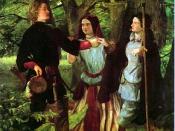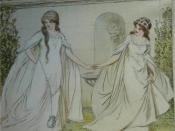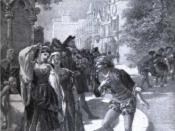The majority of characters in As You Like It end up as lovers, and the play ends with a quadruple wedding. On the path to this quadruple wedding, there are many dialogues between lovers, in which we are exposed to different opinions about what romantic love is, and what marriage means.
As You Like It suggests that love occurs instantly, or it is not love; that love has no boundaries; that lovers are utterly obsessed with their love, to the point of forgetting all else; and that love is a kind of pleasant torture. These are all idealistic ideas about love, and As You Like It contrasts them with the notions that love can be empty; that obsession with love is even slightly pathetic, and that the sentiments of lovers are often ridiculous; and that love is changeable, marriage being plagued by conflict and even infidelity. The offering of this contrast reinforces the general message that love is illogical and unpredictable - a "mere madness".
In this essay I shall consider these ideas one by one; first the concept that love occurs instantly.
Of the three love affairs that are born within the actual lines of the play, three begin at first sight: Rosalind and Orlando, Celia and Oliver, and Phebe for Ganymede. The love between Rosalind and Orlando is shown to have started instantly by the speechlessness of Orlando ("Cannot I say 'I thank you'") after the wrestling. The instantaneous nature of love is shown more directly in the words of Phebe: "whoever loved that loved not at first sight!", and in the description by Rosalind of the meeting of Celia and Oliver:
...no sooner met than they looked, no sooner looked but they loved...
Another idea expressed is that love has no boundaries. We see this in the...


